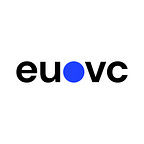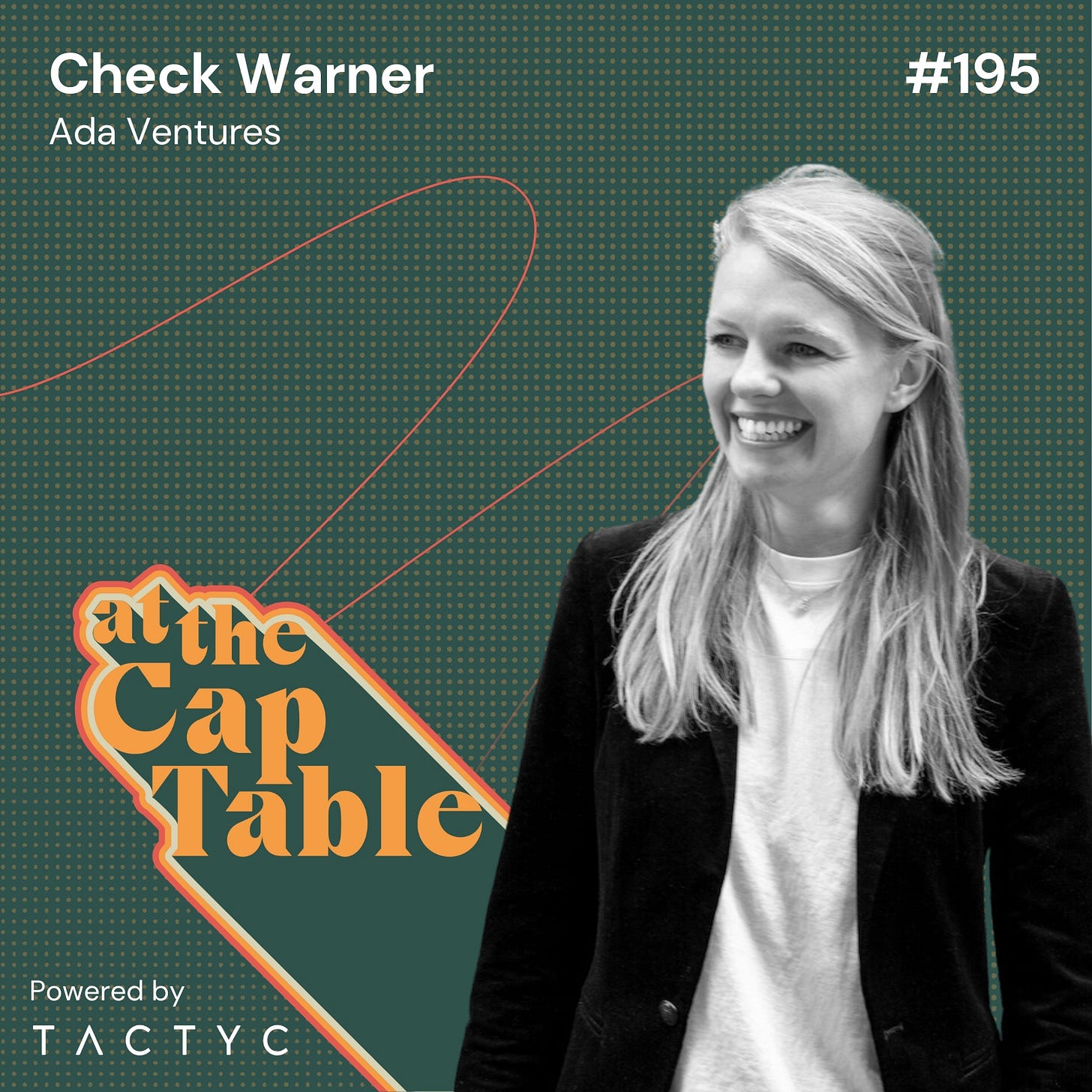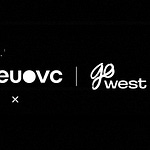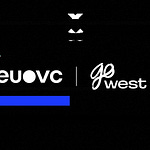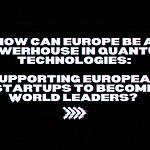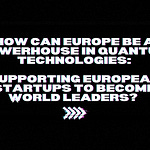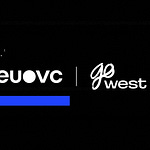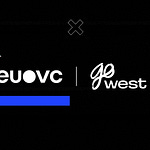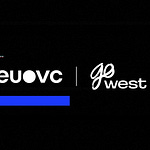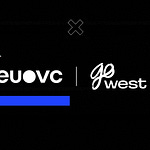In today's episode, Sarah Finegan from Antler speak with someone who likely needs no introduction to many: Check Warner, co-founder of Ada Ventures. Ada Ventures finds and funds extraordinary talent-building breakthrough ideas for the hardest problems we face. Check invests £250,000-1m in UK technology companies across climate, economic empowerment, and healthcare & aging.
So why do we say Check needs little introduction? ‘Cos she’s played an important role in pioneering diversity with initiatives like Future VC, Diversity VC and Ada Ventures, which have all done tons to help drive positive change and foster inclusivity within our industry. An effort recognized with an MBE for services to diversity and inclusion in Venture Capital for her work with Ada Ventures and Diversity VC in the King's New Year’s Honours 2022.
⏬ Scroll on for the core takeaways 🧠
I think VC is about giving entrepreneurs a start to create these incredible ideas that are going to change the world.
This episode was kindly made possible by our friends over at Tactyc - the leading forecasting and scenario-planning software for venture capital funds combining portfolio construction, portfolio management, forecasting, and reporting into a unified platform.
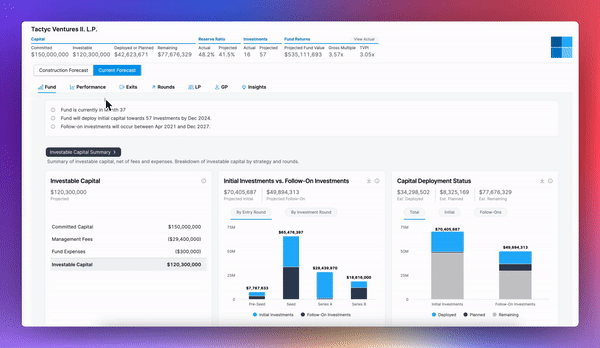
Check's Journey into venture
Initially drawn to the performing arts, Check's passion for acting led her to want to pursue a career in theater. However, upon entering university, she realized the abundance of talented actors and actresses, prompting a pivot towards directing.
The allure of combining creativity with commerce led Check to venture into the advertising industry, where she encountered the transformative power of technology.
I discovered the VC industry on Twitter. I started following all these VCs like Fred Wilson, diving into blogs and reading their tweets and thought “what a fascinating job”, looking at ideas and investing in building the future.
Driven by a deep desire to enter the venture capital space, Check faced the challenge of not having the typical VC background. Undeterred, she sought guidance from mentors and recruiters, often met with skepticism.
Luckily for me, I had a mentor who at that time just met a VC in the previous week. He proposed to come along and meet him. So, I printed out my CV kinda crashed their meeting and sort of pushed myself in front of him and quite boldly, pushed my CV across the table and said «Please hire me into this fund!»
That fund was Downing Ventures, and the guy I pushed my CV to is now my partner in Ada Ventures. I spent six months convincing him to bring me on as his first hire. My pitch was about helping companies’ operations. I said I can be the sales and marketing for portfolio companies, and instead he can teach me everything about being an investor … I am telling you this story because it’s really important that we have different perspectives in the industry. We have people from different backgrounds out there, VCs who had marketing backgrounds, journalist backgrounds, ‘cos you don’t know who can make a great profile.
The birth of Ada
The concept behind Ada came out of the work of Diversity VC.
Having been close to the industry and having observed some of the structural problems Matt and I decided to start a fund that looked at boiling everything back to first principles:
What if we could design a fund with inclusion at its core and where that foundation also applies to the pipeline?
How would we find companies and pick them?
How would we select the people to get involved with?
How would we support the founders?
What would the underlying companies be building?
Who would they be building products and services for?
We call this “adding the infrastructure of inclusion.” And so we have built a fund that does things very differently all across the end-to-end flow.
We are a pre-seed and seed fund.
We now have +100M assets under management, and investing our second fund. We have shown that we can find founders in different places, which means we have a diverse set of founders to pick from.
Our selection process remains objective, ensuring that our portfolio represents a true cross-section of society. In fact, our portfolio boasts a remarkable 15-fold increase in diversity compared to the average UK venture fund, with 60% of our CEOs being female.
Check firmly believe that investing in companies targeting underserved groups will yield fantastic financial returns for their investors.
The potential for accelerated impact is undeniable, as these companies tap into previously untapped markets.
Reflections on raising funds across Europe
You need a strong theory of why you need to exist as a venture capital fund.
There are multiple funds and investors across the world, so, why do we need another project to exist? You need a clear mandate that doesn’t exist elsewhere, and that’s the first thing you have to figure out.
I never anticipated this, but a series of fortuitous events led my co-founder Matt and me to recognize a significant gap in the market.
We saw an opportunity to establish a fund that would address the pressing issue of inclusion, particularly in the pre-seed and seed stages where institutional capital was scarce in the UK.
One of the first challenges encountered by Check was having zero outputs to start from scratch in sourcing funds. It's essential to acknowledge the financial resources required to establish a fund, including fixed costs like FCA regulations, legal fees, and personal expenses incurred during the fundraising process.
Even seemingly minor expenses, like creating a website, can have significant implications. Unfortunately, those who often find themselves in the position of raising funds come from families with wealth.
I vividly recall the agonizing decision to allocate £2,000 for event expenses in the early stages.
We were fortunate to have the privilege and support to access personal savings and accommodations that eased our financial burdens. However, it deeply frustrates me that this opportunity isn't more widely available.
The fundraising process was arduous. We spent 18 months going around the world. We took something like 50 flights, we did 120 versions of our pitch and we ended up with about 30 LPs and hugely supported by British Business Bank.
Additionally, there’s the GP commit, an amount expected from the fund's partners, typically around 1-2% of the total fund size.
Fundraising should not be restricted to individuals with financial means. To truly address diversity and inclusion, we must confront the problem of privilege that pervades both founders and VCs.
For those looking to embark on the same mission as Check, she has a few recommendations that would sure be helpful:
I strongly urge you to consider the power of teamwork and cultivating relationships with potential limited partners early on. Building those connections ahead of time can prevent the last-minute scramble to meet potential investors, as we experienced.
I sincerely hope that in the years to come, the fundraising process becomes less cumbersome and presents fewer barriers.
It's my fervent wish that we can create a more accessible and equitable landscape within the industry, making significant strides in the realm of diversity and inclusion.
Listen to the full discussion with Check on Spotify 👇


